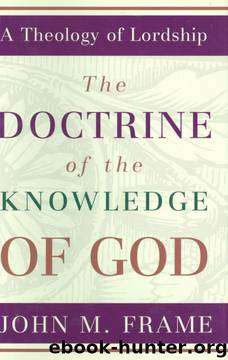Doctrine of the Knowledge of God: A Theology of Lordship by John M. Frame

Author:John M. Frame
Language: eng
Format: mobi
Tags: Philosophy, Reference
ISBN: 9780875522623
Publisher: P&R Publishing
Published: 1987-08-01T00:00:00+00:00
(iii) Family resemblances. Often (some would say always) it is impossible to specify one set of conditions that is always present when a term is properly used. Ludwig Wittgenstein2 noted that game is used in a wide variety of ways. Some games are games of amusement, some involve winning and losing, some are games of skill, and others games of luck, but no one of those features is found in every activity that we call a game. Game, therefore, does not designate a specific group of qualities that is always present in every game. Rather, it is used for a group of activities that have "overlapping and criss-crossing" resemblances to one another. Wittgenstein called these "family resemblances." At a family reunion of the Blodgetts, one will have the Blodgett nose, another the Blodgett dimple, another the Blodgett forehead, and so forth. Quite possibly no one member will have every "typical Blodgett feature." And the same is true for game. Some games are games of amusement, some involve winning and losing, and some are games of skill, but no one game may have all of those typical game features. For that reason, too, there are "fuzzy boundaries" in the way game is used. How many game characteristics must an activity have to be called a game? There is no way to establish a figure for all times and cases, and so it is difficult to define game precisely, to state its "essence," to tell what it "really is."
Download
This site does not store any files on its server. We only index and link to content provided by other sites. Please contact the content providers to delete copyright contents if any and email us, we'll remove relevant links or contents immediately.
The Secret Power of Speaking God's Word by Joyce Meyer(3180)
Signature in the Cell: DNA and the Evidence for Intelligent Design by Stephen C. Meyer(3131)
Real Sex by Lauren F. Winner(3014)
The Holy Spirit by Billy Graham(2944)
The Gnostic Gospels by Pagels Elaine(2527)
Jesus by Paul Johnson(2352)
Devil, The by Almond Philip C(2325)
23:27 by H. L. Roberts(2248)
The Nativity by Geza Vermes(2227)
Chosen by God by R. C. Sproul(2161)
All Things New by John Eldredge(2159)
Angels of God: The Bible, the Church and the Heavenly Hosts by Mike Aquilina(1957)
The Return of the Gods by Erich von Daniken(1943)
Angels by Billy Graham(1922)
Knowing God by J.I. Packer(1854)
Jesus of Nazareth by Joseph Ratzinger(1811)
The Gnostic Gospel of St. Thomas by Tau Malachi(1793)
Evidence of the Afterlife by Jeffrey Long(1786)
How To Be Born Again by Billy Graham(1777)
